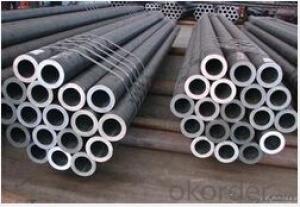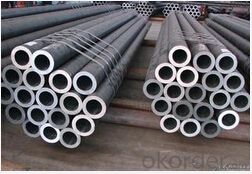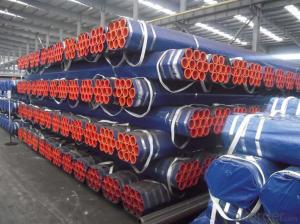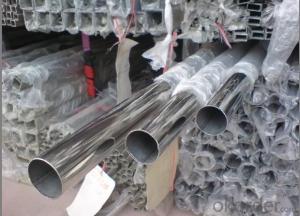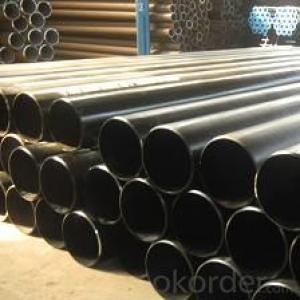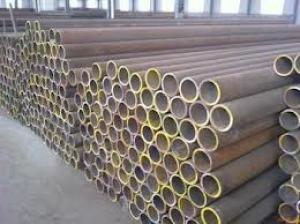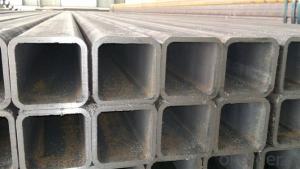Seamless steel tube for transmission of fluids
- Loading Port:
- China Main Port
- Payment Terms:
- TT OR LC
- Min Order Qty:
- -
- Supply Capability:
- -
OKorder Service Pledge
OKorder Financial Service
You Might Also Like
Standard:
GB/T8163 Chinese national standard
Application:
General seamless steel tubes for conveying fluids
Models of major steel tubes:
10.20,Q345,etc.
Diamensional tolerances:
Types of steel tubes | Outer diameter | Wall thickness | ||
Cold-rolled tubes | Tube sizes(mm) | Tolerances(mm) | Tube sizes (mm) | Tolerances(mm) |
>30~50 | ±0.3 | ≤30 | ±10% | |
>50~219 | ±0.8% | |||
Hot-rolled tubes | >219 | ±1.0% | >20 | ±10% |
Mechanical properties:
Standard codes | Models of steel tubes | Tensite strength(MPa) | Yield strength(MPa) | Elongation(%) |
GB/T8163 | 10 | 335~475 | ≥205 | ≥24 |
20 | 410~550 | ≥245 | ≥20 | |
Q345 | 490~665 | ≥325 | ≥21 |
Chemical composition:
Standard codes | Models of steel tubes | Chemical compositions(%) | |||||||
C | Si | Mn | P | S | Cr | Ni | Cu | ||
GB/T8163 | 10 | 0.07~0.14 | 0.17~0.37 | 0.35~0.65 | ≤0.035 | ≤0.035 | ≤0.15 | ≤0.25 | ≤0.25 |
20 | 0.17~0.24 | 0.17~0.37 | 0.35~0.65 | ≤0.035 | ≤0.035 | ≤0.25 | ≤0.25 | ≤0.25 | |
Q345 | 0.12~0.20 | 0.20~0.55 | 1.20~1.60 | ≤0.045 | ≤0.045 | / | / | / | |
- Q: How do steel pipes handle ground settlement?
- Steel pipes are generally robust and durable, making them well-suited for handling ground settlement. The flexibility and strength of steel allow the pipes to withstand the shifting and settling of the ground without significant damage. Steel pipes have a high resistance to deformation, which means they can maintain their shape and structural integrity even when the ground settles or moves. When the ground settles, steel pipes can accommodate the movement by flexing and bending slightly. This flexibility allows them to adjust to changes in the ground without breaking or cracking. Additionally, steel pipes are often designed with joints that can absorb and distribute stress caused by ground settlement. Furthermore, steel pipes have a smooth interior surface that minimizes friction and resistance to the flow of materials. This feature is particularly important when the ground settles because it reduces the likelihood of clogs or blockages due to debris or sediment settling in the pipes. In summary, steel pipes are well-equipped to handle ground settlement due to their strength, flexibility, and resistance to deformation. They can adapt to the movement of the ground without compromising their structural integrity, making them a reliable choice for various applications, including underground infrastructure and pipeline systems.
- Q: How are steel pipes protected against mechanical damage during transportation?
- Various measures are implemented to safeguard steel pipes against mechanical damage during transportation. One commonly used technique involves the application of protective coatings or wrapping materials, typically composed of plastic, rubber, or epoxy. These coatings serve as a physical barrier, shielding the pipes from scratches, dents, and other forms of mechanical harm. Another method involves the utilization of padding or cushioning materials, such as foam inserts or rubber gaskets. These materials are inserted inside or wrapped around the pipes, absorbing any impacts or shocks that may occur during transportation. This effectively prevents potential damage caused by vibrations or bumps. Additionally, steel pipes are frequently secured and immobilized within transportation containers through the use of straps, braces, or other securing devices. These measures ensure that the pipes remain stable and do not collide with one another, thereby minimizing the risk of mechanical harm. Furthermore, proper handling and loading techniques play a crucial role in protecting steel pipes during transportation. This involves the utilization of appropriate lifting equipment, such as cranes or forklifts, to prevent any accidental dropping or mishandling of the pipes. Moreover, pipes are often stored or stacked in a manner that minimizes the possibility of deformation or bending. Ultimately, a combination of protective coatings, cushioning materials, securement devices, and proper handling techniques are employed to ensure the safe transportation of steel pipes and maintain their optimal condition for use in various applications.
- Q: How are steel pipes recycled at the end of their life cycle?
- Steel pipes are typically recycled at the end of their life cycle through a process called steel scrap recycling. This involves collecting the used pipes, cleaning them to remove any contaminants, and then shredding or cutting them into smaller pieces. These pieces are then melted down in a furnace to create new steel products, including pipes. The recycled steel pipes are then ready for use in various industries, reducing the need for new production and conserving valuable resources.
- Q: Can steel pipes be used for transporting hazardous materials?
- Yes, steel pipes can be used for transporting hazardous materials. Steel is known for its strength and durability, making it suitable for handling and containing hazardous substances. It is commonly used in various industries, such as oil and gas, chemical, and wastewater treatment, to transport materials that pose a potential risk to human health or the environment. Additionally, steel pipes can resist corrosion and high pressure, ensuring the safe transportation of hazardous materials.
- Q: What is the meaning of "DN" and "Phi" in the dimensioning of steel pipe diameter and how to apply the mark?
- DN refers to the nominal diameter of the pipe, but this is neither the outside diameter nor the inside diameter, and the "Phi" means the outer diameter of the steel pipe. For example, the same nominal diameter of the steel pipe due to its different wall thickness, corresponding to the outer diameter is also different. As can be seen from the chart below:Project control table (commonly used) diameter pressure pipe standard pressure pipe standard pressure pipe standard specification DN- nominal diameter: diameter of large diameter series DN15- 22mm DN20- 27mm DN25- phi, Phi Phi Phi Phi 34mm, DN32- 42mm DN40- 48mm DN50- 60mm DN65-, Phi Phi 76 (73) mm, DN80- 89mm DN100- 114mm DN125- and Phi Phi Phi. 140mm DN150- 168mm DN200- 219mm DN250- phi, Phi Phi Phi Phi 273mm, DN300- 324mm DN350- 360mm DN400- 406mm DN450- 457mm DN500- and Phi Phi Phi Phi, 508mm DN600- 610mm, DN15- 18mm series of small diameter Phi Phi Phi, DN20- 25mm DN25- 32mm DN32- 38mm DN40- 45mm DN50- Phi Phi, Phi Phi Phi 57mm DN65- 73mm, DN80- 89mm DN100- 108mm, DN125- 133mm DN150- 159mm DN200- and Phi Phi Phi Phi, 219mm DN250- 273mm DN300- 325mm DN350- 377mm, Phi phi,
- Q: What is the outer diameter and wall thickness of DN40 steel pipe?
- DN40, refers to the diameter of 40mm, that is, an inch and a half, there are welded pipe and galvanized pipe,Ordinary wall thickness 3.5mm wt 3.84kg/mThicken 4.25mm weight 4.58kg/m
- Q: Can steel pipes be used for conveying solid materials?
- Yes, steel pipes can be used for conveying solid materials. Steel pipes are known for their durability and strength, making them suitable for transporting various solid materials such as ores, grains, coal, and construction materials. The smooth interior of steel pipes allows for efficient flow and minimal friction, making them a preferred choice in industries like mining, agriculture, and construction.
- Q: How do you measure the thickness of a steel pipe?
- To measure the thickness of a steel pipe, you can use various methods depending on the precision required and the tools available. Here are three common approaches: 1. Calipers or Vernier Calipers: Calipers are a simple and widely used tool for measuring thickness. Open the calipers and place the jaws on either side of the pipe, ensuring they are perpendicular to the surface. Close the jaws until they lightly touch the pipe, then read the measurement on the caliper scale. 2. Ultrasonic Thickness Gauge: This method offers more accurate results and is often used in industrial settings. An ultrasonic thickness gauge emits high-frequency sound waves that penetrate the steel pipe. By measuring the time it takes for the sound waves to bounce back, the gauge calculates the thickness of the pipe. Ensure the pipe surface is clean and smooth before taking the measurement. 3. Magnetic Thickness Gauge: This method is specifically designed for measuring the thickness of ferrous materials like steel. The gauge contains a small magnet that adheres to the pipe surface. By applying a magnetic field, the gauge measures the distance between the magnet and the base plate. This distance corresponds to the thickness of the steel pipe. It's important to note that each method has its own accuracy limitations, and the choice of measurement technique should be based on the desired precision, availability of tools, and the specific requirements of the application.
- Q: How are steel pipes specified in engineering drawings?
- Steel pipes are specified in engineering drawings by providing information such as the diameter, length, wall thickness, material grade, and any other relevant specifications or standards that need to be followed.
- Q: What are the different types of steel pipe coatings?
- There are several types of steel pipe coatings, including epoxy coatings, polyethylene coatings, polyurethane coatings, and zinc coatings. These coatings help protect the steel pipes from corrosion, increase their lifespan, and improve their performance in various environments.
Send your message to us
Seamless steel tube for transmission of fluids
- Loading Port:
- China Main Port
- Payment Terms:
- TT OR LC
- Min Order Qty:
- -
- Supply Capability:
- -
OKorder Service Pledge
OKorder Financial Service
Similar products
Hot products
Hot Searches
Related keywords
